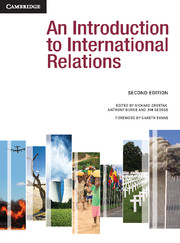Book contents
- Frontmatter
- Contents
- Tables, Figures and Boxes
- Contributors
- Preface and acknowledgements
- An Introduction to International Relations: The origins and changing agendas of a discipline
- 1 Theories of International Relations
- 1 International Relations Theory in an Age of Critical Diversity
- 2 Realism
- 3 Liberalism
- 4 Marxism and Critical Theory
- 5 Feminism
- 6 Postmodernism
- 7 Constructivism
- 8 Theories of Global Justice
- 2 The Traditional Agenda
- 3 The New Agenda
- Glossary of Terms
- Bibliography
- Index
- References
4 - Marxism and Critical Theory
from 1 - Theories of International Relations
- Frontmatter
- Contents
- Tables, Figures and Boxes
- Contributors
- Preface and acknowledgements
- An Introduction to International Relations: The origins and changing agendas of a discipline
- 1 Theories of International Relations
- 1 International Relations Theory in an Age of Critical Diversity
- 2 Realism
- 3 Liberalism
- 4 Marxism and Critical Theory
- 5 Feminism
- 6 Postmodernism
- 7 Constructivism
- 8 Theories of Global Justice
- 2 The Traditional Agenda
- 3 The New Agenda
- Glossary of Terms
- Bibliography
- Index
- References
Summary
Introduction
This chapter introduces students to the rich and controversial legacy of Marxism and one of its major offshoots in the twentieth century, Critical Theory. The common thread linking the two theories is an interest in struggles to dismantle structures of oppression, exclusion and domination. The chapter is in two parts. The first focuses on Marxism and its contribution to IR, the second on an offshoot of Marxism that goes by the name Critical Theory. The part on Marxism provides a discussion of how Marx’s ideas have been received in IR, an account of the historical and intellectual context that ‘created’ Marxism, and an account of Marx’s method of historical materialism. The part on Critical Theory provides outlines of the two strands of Critical Theory that have emerged within IR: a strand derived from the so-called Frankfurt School, and a strand derived from Italian thinker Antonio Gramsci.
Historical and intellectual context: Marx and the critique of capitalism
During the nineteenth century, European societies underwent dramatic and sometimes traumatic changes internally, while expanding their colonial rule to almost every corner of the world. Importantly, this expansion of European imperialism and the global consolidation of what is often referred to as the ‘Westphalian states-system’ occurred simultaneously with the comprehensive shift to industrialised production (known as the Industrial Revolution), significant changes in the ownership and control of property and large-scale population transfers, both internally and externally towards parts of the colonised world. By the nineteenth century economic affairs were also changing significantly, with the gradual demise of mercantilism and the rise of capitalism. Victorian Britain (England, specifically) had emerged as the hotbed of these developments, with its extraordinary innovations in industrial production and technology and in the capitalist production processes. It also provided many of the conceptual principles for understanding and legitimising the socio-economic transformations inaugurated by capitalism.
- Type
- Chapter
- Information
- An Introduction to International Relations , pp. 62 - 75Publisher: Cambridge University PressPrint publication year: 2011

